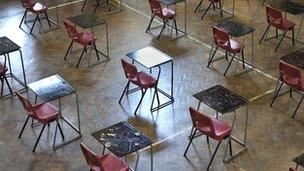Schools that fail Ofsted 'likely to improve'
- Published

Exam results improved on average by 10% among schools that had narrowly failed inspections
Narrowly failing an Ofsted inspection is more likely to prompt an improvement in schools, rather than begin a spiral of decline, according to research.
The academic study examined the consequences for secondary schools in England of being labelled as failing.
Among schools which had "just failed", this setback was more likely to be a catalyst for recovery, the study found.
An average 10% rise in GCSE results after a failed inspection showed such interventions worked, said researchers.
The study by Rebecca Allen, of the Institute of Education, University of London, and Simon Burgess, Centre for Market and Public Organisation, University of Bristol, looked at the outcomes for underperforming schools.
It addressed the key question of whether the process of being failed by inspectors was likely to damage a school even more - or whether it could be the springboard for a recovery.
Better to fail?
This study focused on schools just above and below the boundary between satisfactory and unsatisfactory, to make a comparison between schools not too far apart in levels of achievement.
Falling on the wrong side of this divide - and being failed by inspectors - could be a long-term advantage, according to the study, which looked at inspection results from between 2002 to 2008.
And it found less evidence that failing an inspection triggered an irrevocable process of decline - damaging morale, risking pupil numbers and undermining staff recruitment.
"It could be worse to be judged as satisfactory," said Dr Allen.
The judgement that a school was failing "empowered" head teachers to take corrective action, she said.
An improvement of 10% in GCSE results was the average recovery following a failed inspection, the research found.
Dr Allen said these improvements were also in the core subjects, such as English and maths, suggesting this was substantial and significant progress.
"It suggests there is a lot of capacity to do better within schools," she said.
Dr Allen accepted that inspections were stressful for teachers, but argued that these improvements in results, following an Ofsted intervention, showed the public value.
This study did not address what happened to schools with more severe problems, which had been found to be inadequate by inspectors.
There has been increasing attention paid to borderline schools, with Ofsted's chief inspector, Sir Michael Wilshaw, announcing that the "satisfactory" grade would be designated as "requires improvement".
This is part of an attempt to drive improvements in so-called "coasting" schools.
- Published17 January 2012
- Published5 December 2011
- Published22 November 2011